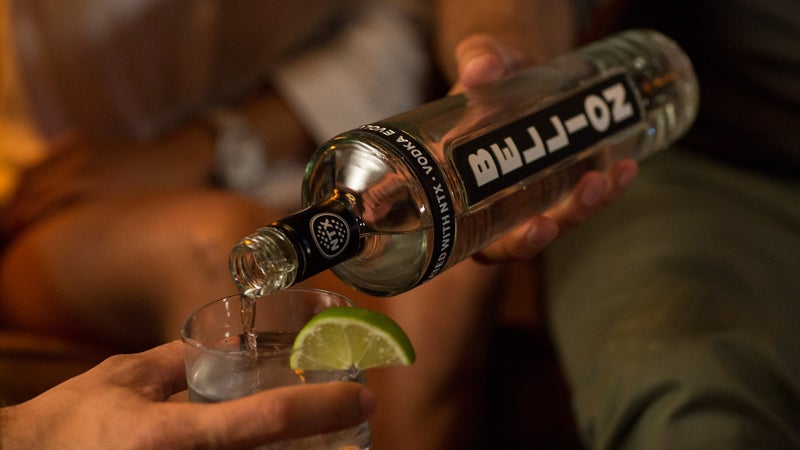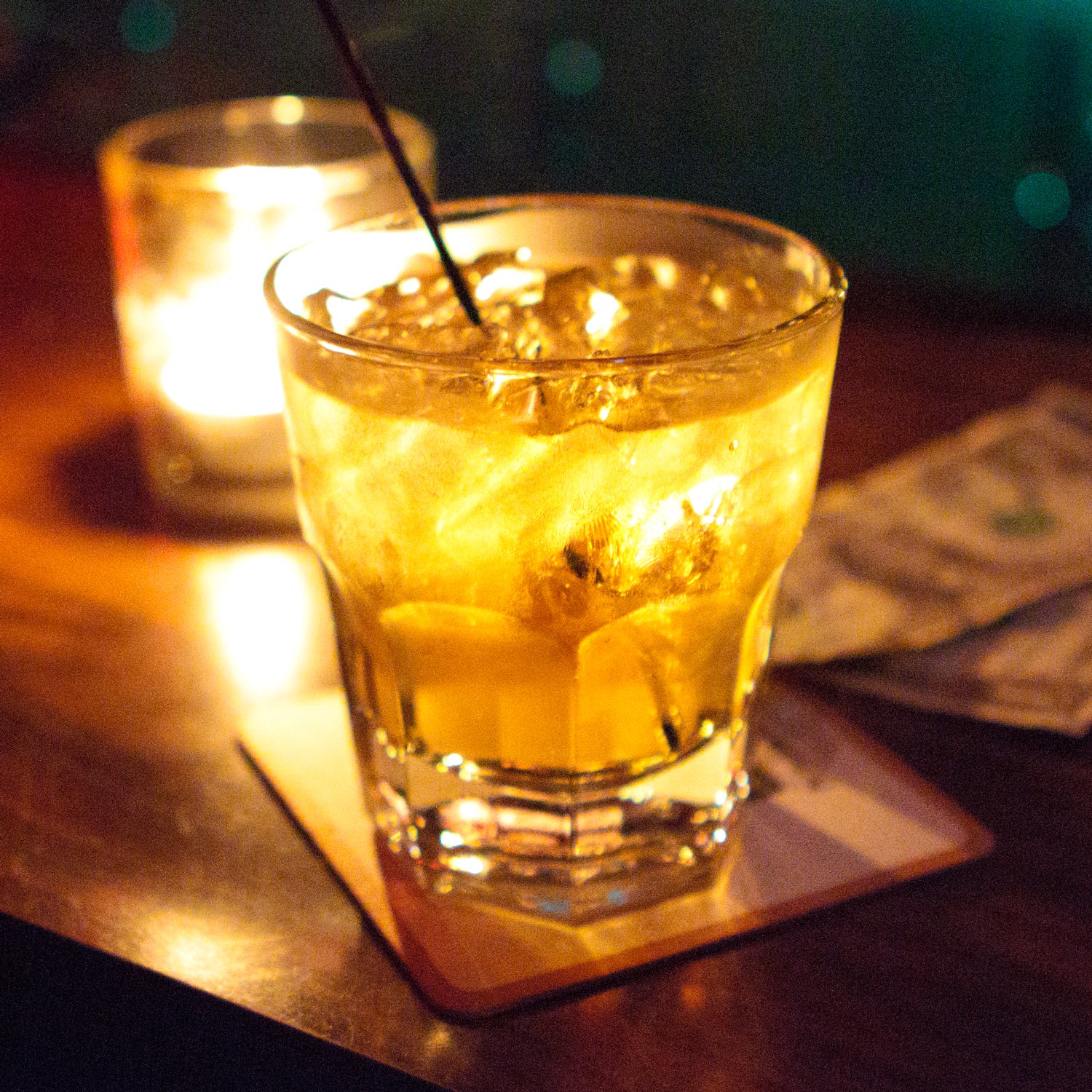The email subject line read, “The science of making alcohol liver and DNA friendly.” If anyone knows the allure of liver-friendly alcohol, it’s the poor schmuck who has to bang out a tempo run after a night of drinking—something I have done on occasion. So I bit, replying to the email and asking for a sample of NTX Technology’s “healthy” vodka.
When it arrived, my husband and I downed a rather large portion of a fifth on a Friday night. “Get this, it’s liver friendly, so I’m totally going to be able run in the morning,” I bragged as I set my alarm for 5:30 a.m. At 9 a.m., when my dog crawled into bed to make sure I was still alive, my husband and I turned to each other and acknowledged: that bottle of vodka was not hangover-free.
“It’s not supposed to be hangover-free,” said Harsha Chigurupati, founder of NTX Technology, when I called him a few days later. Now you tell me, I thought grumpily.

Instead, Chigurupati says, his product is supposed to make alcohol “functional,” which is a fancy way of saying “not as bad for you.” NTX claims to have engineered booze in a way that is less damaging to your body, though you may still feel its aftershocks.
There are many hangover-oriented products, none of which have proven effective for all. Those products are “largely concerned with symptomatic relief rather than a cure,” says David Hanson, a sociology professor at the State University of New York in Potsdam who’s been studying humans’ collective fascination with alcohol since the late 1960s. But in the past decade, the idea of engineering an alcohol that won’t give you a hangover—or at least won’t be as bad for your body in the long run—has been circulating in scientific circles. A few people even claim they’ve hacked the problem.
Creating a safer vodka means trying to stop certain biological processes from happening. That’s as complex as it sounds. Alcohol wreaks havoc on us in a few ways. It spurs urine production, making us dehydrated. It irritates our stomach lining and opens blood vessels, which can cause vomiting and headaches, respectively. There are also the concerning long-term effects. Breaking down alcohol is hard work and can cause oxidative stress, or the stripping of electrons from atoms, which can contribute to cellular damage and accelerate the aging process. Two enzymes in your body also process alcohol into a chemical called acetaldehyde, which, , is a known carcinogen.
At the moment, companies and researchers are attacking these problems with a few different strategies. Some want to make regular booze that’s loaded with protective antioxidants, so you get a hit of good stuff with every shot of the bad stuff. Others want to circumvent the entire alcohol metabolism process entirely and target your brain so you feel the effects of alcohol without actually consuming it.
“I’m open-minded but skeptical about these new products,” says Hanson. “For decades, I’ve seen numerous supposed ‘breakthroughs’ of various sorts, yet they’ve repeatedly failed to fulfill their promise. But perhaps this time….”
We like his optimism—almost as much as we like the promise of consequence-free booze. Here’s where the quest for functional alcohol stands today, and the experts’ verdict on whether they take us any closer to that holy grail.
Antioxidant-Loaded Alcohol
Chigurupati, who has family members who work in pharmaceuticals, released his first product to market this year. But he started working on NTX, which stands for “no toxins,” in 2006. The idea was to infuse alcohol with compounds that wouldn’t alter the taste of the booze but could reduce the accompanying oxidative stress and DNA damage. NTX isn’t making its own liquor; it’s simply partnering with companies to add a proprietary blend of antioxidants to existing spirits. “We worked backwards from what was already approved [by the FDA],” says Chigurupati.
The final product includes tasteless ingredients like licorice root extract, mannitol, and potassium sorbate, which “have free-radical scavenging properties that make them antioxidative.” Chigurupati adds that these additives also have “immunomodulatory capabilities,” meaning they may be able to bolster our immune system to help our bodies cope with the hell alcohol puts us through.
Chigurupati used his pharmaceutical backing to conduct tests showing that liquor with added NTX technology would be less harmful to DNA than traditional liquor. One of these tests, called a comet assay, showed a small reduction in DNA damage when drinking an NTX-infused spirit instead of a traditional one. But Silvia Balbo, a professor at the University of Minnesota’s school of public health, is skeptical. She feels the effects seen in testing were not particularly dramatic.
“Alcohol is not really safe, period,” responds Chigurupati. “But could there be a safer alcohol? We think so.”
A Chemical Replacement for Alcohol
Alcohol does wonders for your brain—like making you think your jokes are hilarious and your dance moves are legit. David Nutt, a professor of neuropsychopharmacology at Imperial College London has spent the past decade trying to figure out how to get that desirable brain effect without drawing the rest of your body into the equation. The result of his work is alcosynth, a tasteless, low-calorie and, , hangover-free chemical. To be clear, it’s not modified alcohol but an engineered chemical in liquid form that lights up exactly the same part of the brain that booze does. “It’s utterly different, which is why it is so much less toxic,” he says, explaining that unlike whiskey, alcosynth doesn’t break down into acetaldehyde.
Exactly how alcosynth works and how it’s made is still a closely guarded secret, but Nutt says you only need a tiny drop of it to get the buzz of a single drink. Nutt is currently working his way through the government approval process in the UK, but he says that with proper funding and cooperation from regulatory entities, alcosynth could be on the market in as little as a year.
Still, others working in the addiction space are skeptical that alcosynth will be the lifesaver that Nutt seems to think it will be. Bottom-shelf tequila aside, alcohol is enjoyable to drink. Many of us savor sipping whiskey or swirling red wine around a glass. Alcosynth would likely deprive us of that experience. And Hanson argues that hangovers actually serve a useful evolutionary purpose. “A lot of things that bring us pleasure have consequences,” he says. Much like eating, drinking is wonderful but makes us sick when done in excess. “These consequences help us moderate ourselves,” Hanson says. He theorizes that without such consequences, the temptation to get hammered nightly might be hard to resist.
Supplements with Acetaldehyde Scavengers
We’ve identified acetaldehyde as a key culprit in alcohol’s revenge—shouldn’t we be finding ways to eliminate it from the body? That’s the thought process behind products like , a supplement that promises to help speed elimination of acetaldehyde from the body. Some scientific research shows the elimination of acetaldehyde can be sped up by taking supplements of L-cysteine, an amino acid that seeks out the chemical and helps accelerate the breakdown process. In 2002, participants in a study published in the International Journal of Cancer, were given tablets containing either L-cysteine or a placebo. Those who took the L-cysteine tablets had reduced concentrations of acetaldehyde in their saliva.
But “acetaldehyde is only one part of the problem,” says Balbo. You’d still have to deal with the increased urine causing dehydration and the irritation of your stomach lining that makes you puke. Plus, for Alcotox to work, it’s crucial that you take it right after drinking.
North Korea’s Ginseng Spirit
Early last year, North Korea’s state-run newspaper, the Pyongyang Times, that the Taedonggang Foodstuff Factory had crafted a hangover-free spirit. Made from ginseng and rice, it supposedly has essential amino acids and vitamins that somehow, miraculously negate an entire night’s worth of drinking. While state-run media announcements should always be viewed skeptically, there may actually be something to it. published in Food and Function found that ingesting red ginseng could lower plasma alcohol concentrations and reduce hangover symptoms.
Not Drinking Like An Idiot
Technology is a wonderful thing, but there’s an easy, low-tech way to make sure you never get a hangover or do serious cellular damage: don’t drink to excess. “It’s clear that alcohol in moderation has real health benefits,” says Hanson, who drinks daily. Balbo also imbibes without anxiety, even though her work focuses on figuring out how alcohol and cancer are related. “I never binge drink, I never get drunk, and I drink with meals,” she says. When it comes to alcohol, the problems all center on the size of the dose.


